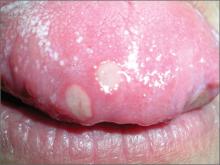The family physician recognized his condition as recurrent aphthous ulcers (RAS) with giant ulcers.
Aphthous ulcers are painful ulcerations in the mouth, which can be single, multiple, occasional, or recurrent. These ulcers can be small or large but are uniformly painful and may interfere with eating, speaking, and swallowing. While the precise etiology of RAS is unclear, the following are risk factors:
- oral trauma
- stress and anxiety
- systemic diseases (eg, Celiac disease, Crohn’s disease, Behçet’s syndrome, human immunodeficiency virus, reactive arthritis)
- medications (nonsteroidal anti-inflammatory drugs, beta-blockers, angiotensin-converting enzyme inhibitors)
- vitamin deficiencies (eg, zinc, iron, B12, folate)
- food and chemical sensitivities.
Topical corticosteroids, such as fluocinonide gel or dexamethasone elixir, can promote healing and lessen the severity of RAS. Patients should be instructed to dab the area of the ulcer dry, apply the gel, paste, or cream after rinsing, and avoid eating or drinking for at least 30 minutes.
Amlexanox 5% paste (Aphthasol) reduces ulcer size, pain duration, and healing time. It is a nonprescription paste that is applied directly to ulcers 4 times a day until the ulcers heal. Lidocaine 1% cream applied to aphthous ulcers was found to reduce pain intensity compared to a placebo cream. In severe RAS cases, systemic therapy with oral steroids, montelukast, colchicine, or pentoxifylline should be considered.
In this case, no underlying systemic disease was found. The patient was started on oral prednisone on the first visit and given dexamethasone oral elixir to swish and swallow. Within one week, the patient was able to eat and drink liquids comfortably and began regaining his lost weight. Long-term management of his problem will likely require use of montelukast, colchicine, or pentoxifylline to taper him off prednisone without recurrences.
Photos and text for Photo Rounds Friday courtesy of Richard P. Usatine, MD. This case was adapted from: Usatine R, Gonsalves W. Aphthous ulcer. In: Usatine R, Smith M, Mayeaux EJ, et al, eds. Color Atlas of Family Medicine. 2nd ed. New York, NY: McGraw-Hill; 2013:244-248.
To learn more about the Color Atlas of Family Medicine, see: http://www.amazon.com/Color-Family-Medicine-Richard-Usatine/dp/0071769641/
You can now get the second edition of the Color Atlas of Family Medicine as an app by clicking this link: http://usatinemedia.com/


